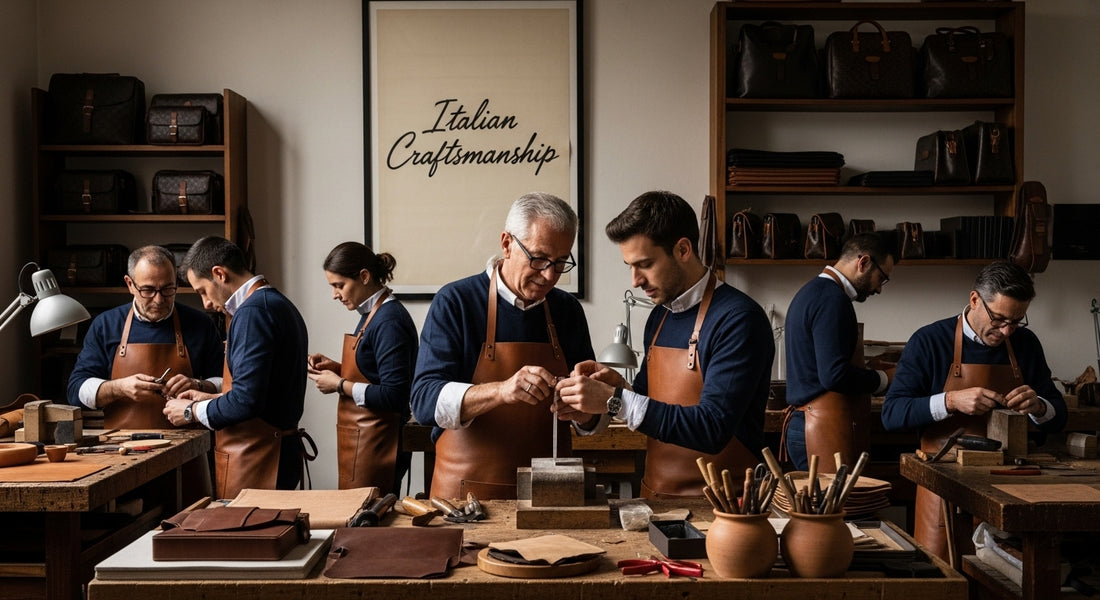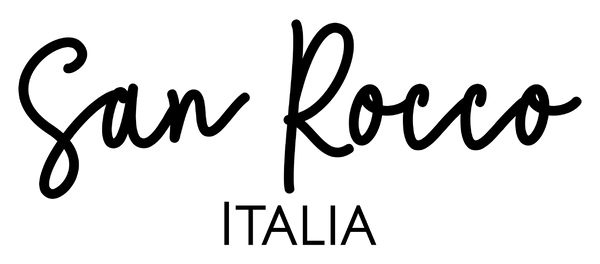
Understanding Why Choose Made in Italy for Quality Style
Share
Italian craftsmanship is often praised for its beauty and finesse and has become synonymous with luxury all over the world. Yet, the real surprise lies not in the price tags but in the painstaking dedication behind every piece. Some Italian brands spend over 30 hours handcrafting a single handbag. This is where tradition meets artistry in astonishing ways, turning everyday objects into personal heirlooms with stories stitched into every seam.
Table of Contents
- The Essence Of Italian Craftsmanship
- Why Authenticity Matters In Style Choices
- The Significance Of Quality In Fashion
- Understanding The Heritage Of Italian Brands
- Sustainability And Ethical Practices In Italian Products
Quick Summary
| Takeaway | Explanation |
|---|---|
| Italian craftsmanship values cultural heritage. | It prioritises traditional techniques, transforming materials into works of art that celebrate precision and beauty. |
| Authenticity in style reflects personal values. | Choosing genuine, crafted items signals a commitment to quality and cultural appreciation over fleeting trends. |
| Quality goes beyond aesthetics in fashion. | Exceptional quality is determined by craftsmanship, durability, and the narrative of each piece, not just its appearance. |
| Sustainability is integral to Italian manufacturing. | Ethical practices encompass environmental responsibility, worker welfare, and the preservation of traditional craftsmanship techniques. |
| Italian brand heritage tells stories of cultural legacy. | These brands combine generational knowledge and innovative designs, merging past traditions with modern relevance. |
The Essence of Italian Craftsmanship
Italian craftsmanship represents a profound cultural heritage that transcends mere manufacturing, embodying centuries of artistic tradition, technical expertise, and an unwavering commitment to exceptional quality. This unique approach transforms ordinary materials into extraordinary works that celebrate precision, beauty, and human skill.
Philosophical Foundations of Craftsmanship
At its core, Italian craftsmanship is rooted in a deep respect for traditional techniques passed through generations. Artisans do not simply create products they preserve cultural narratives and artistic expressions. According to research published in the Directory of Open Access Journals, these craft entrepreneurs prioritize cultural value over functional goods, blending time-honored methods with innovative approaches.
Key philosophical principles of Italian craftsmanship include:
- Respect for material integrity
- Prioritising manual skill over mass production
- Commitment to aesthetic and functional excellence
Artisanal Techniques and Precision
Each craftsperson brings years of training and an intimate understanding of their materials. Whether working with leather, ceramics, textiles, or metalwork, Italian artisans approach their craft with meticulous attention to detail. Every stitch, cut, and finish represents a deliberate artistic choice reflecting generations of accumulated knowledge.
For those interested in exploring this rich tradition further, read more about Italian leather craftsmanship techniques and discover the intricate processes behind creating truly exceptional products.
The essence of Italian craftsmanship goes beyond creating objects it represents a cultural philosophy that values beauty, quality, and human creativity. It transforms manufacturing from a mechanical process into an art form, ensuring each piece tells a unique story of skill, passion, and tradition.
Why Authenticity Matters in Style Choices
Authenticity in style transcends mere fashion trends it represents a profound commitment to quality, personal identity, and cultural heritage. In an era of mass production and fleeting digital trends, choosing authentic pieces becomes a statement of individual values and aesthetic discernment.
The Deeper Meaning of Authentic Style
Authentic style is not about blindly following trends but understanding the narrative behind each piece. According to the Italian Ministry of Economic Development, authentic products embody a unique blend of quality, elegance, and tradition that reflects deeper cultural significance.
Key characteristics of authentic style include:
- Intentional selection over impulse buying
- Appreciation of craftsmanship and design heritage
- Personal connection to the item’s story and origin
Beyond Surface Level Fashion
Authentic style choices represent a commitment to quality that extends far beyond aesthetic appeal. When consumers select genuine, carefully crafted pieces, they invest in items that carry intrinsic value, durability, and meaningful design history. Each authentic piece tells a story of skill, cultural tradition, and artistic expression.
For those seeking to understand the nuanced world of authentic style, explore our guide on Italian leather craftsmanship techniques to appreciate the depth behind truly remarkable design.
Choosing authenticity means rejecting disposable fashion and embracing pieces that reflect personal values, cultural appreciation, and a commitment to timeless elegance. It transforms style from a superficial practice into a meaningful form of personal and cultural expression.
Below is a table highlighting the distinguishing features of authentic style versus fast fashion, summarising their impact on personal values and design philosophy.
| Aspect | Authentic Style | Fast Fashion |
|---|---|---|
| Roots | Cultural heritage, craftsmanship | Mass production, trend-driven |
| Selection approach | Intentional and mindful | Impulsive, based on current trends |
| Durability | Long-lasting and premium materials | Short lifespan, lower quality |
| Connection to item | Personal, values-driven, story behind each piece | Lacks individual meaning |
| Approach to trends | Timeless, transcends fleeting fashions | Rapidly changing, disposable |
| Environmental impact | Lower (sustainable practices prioritised) | Higher (encourages overconsumption) |
The Significance of Quality in Fashion
Quality in fashion transcends mere aesthetic appeal it represents an intricate fusion of design philosophy, material integrity, and long-term value creation. Understanding quality requires a holistic perspective that evaluates craftsmanship, durability, and the profound narrative embedded within each carefully constructed piece.
Defining Quality Beyond Surface Appearance
True quality is not determined by price tags or brand names, but by meticulous attention to detail, superior material selection, and technical expertise. According to research exploring quality in fashion brands, quality perception is deeply interconnected with national branding and aesthetic values.
Key markers of exceptional fashion quality include:
- Precision in construction techniques
- Selection of premium raw materials
- Seamless integration of design and functionality
- Durability and timeless aesthetic appeal
The Economic and Environmental Perspective
Investing in high-quality fashion pieces represents a sophisticated approach to consumption. Quality garments and accessories offer superior longevity, reducing the environmental impact associated with fast fashion’s disposable culture. By choosing well-crafted items, consumers make a statement about sustainability, personal values, and aesthetic discernment.

For those wanting to delve deeper into understanding craftsmanship, explore our guide on Italian leather craftsmanship techniques and discover the intricate processes behind creating exceptional products.
Quality in fashion is ultimately about respecting the artisan’s skill, understanding material potential, and recognising that true style is an investment in personal expression that extends far beyond temporary trends.
 It represents a commitment to excellence that transforms clothing from mere coverings into meaningful cultural artifacts.
It represents a commitment to excellence that transforms clothing from mere coverings into meaningful cultural artifacts.
Understanding the Heritage of Italian Brands
Italian brands represent more than commercial entities they are living repositories of cultural legacy, artistic expression, and generational craftsmanship. Their heritage is a sophisticated narrative of innovation, passion, and unwavering commitment to excellence that extends far beyond conventional manufacturing.
Roots of Cultural Significance
The foundation of Italian brand heritage traces back to Renaissance guilds and family workshops where skill transmission was both an economic and cultural practice. According to research exploring Italian manufacturing traditions, these brands have meticulously preserved artisanal techniques that transform products into meaningful cultural artifacts.
Essential characteristics defining Italian brand heritage include:
- Generational knowledge transfer
- Commitment to traditional manufacturing techniques
- Emphasis on individual craftsmanship
- Deep regional identity and pride
Preserving Tradition Through Innovation
Italian brands uniquely balance respect for traditional methods with forward thinking design. They do not merely reproduce historical styles but reinterpret them through contemporary lenses, ensuring their cultural relevance remains dynamic and engaging.
Explore the future of Italian leather craftsmanship to understand how these brands continue evolving while maintaining their core artistic principles.
Ultimately, Italian brand heritage represents a profound dialogue between past and present a testament to the enduring power of craftsmanship, creativity, and cultural expression that transcends mere commercial transactions.
Sustainability and Ethical Practices in Italian Products
Sustainability in Italian product manufacturing represents a holistic approach that seamlessly integrates environmental responsibility, social consciousness, and exceptional quality. It transcends mere compliance with regulations and emerges as a profound commitment to ethical production and long-term ecological stewardship.
Cultural Foundations of Sustainable Practices
Italian manufacturers have long understood that sustainability is not a trend but a fundamental business philosophy. According to research examining consumer preferences and sustainability, companies integrating sustainable practices experience significant competitive advantages, including enhanced brand value and improved stakeholder relationships.
Core principles of Italian sustainable manufacturing include:
- Minimising environmental impact
- Prioritising worker welfare
- Using renewable and recycled materials
- Maintaining transparent supply chains
- Preserving traditional craftsmanship techniques
Economic and Social Responsibility
Ethical practices in Italian product manufacturing extend beyond environmental considerations. They represent a comprehensive approach to business that values human dignity, fair labour practices, and community development. Manufacturers increasingly view sustainability as an investment in long-term social and economic resilience.
Learn more about the principles of slow fashion and understand how ethical production transforms consumer experiences.
Ultimately, sustainability in Italian products symbolises a sophisticated commitment to creating value that respects human potential, environmental integrity, and the intricate connections between economic prosperity and ecological well-being.
This table presents core principles and practices defining sustainable and ethical Italian manufacturing, making it clear how these drive both business philosophy and social responsibility.
| Principle | Environmental Impact | Social/Ethical Practice |
|---|---|---|
| Minimising environmental impact | Reduced waste, pollution | |
| Prioritising worker welfare | Safe conditions, fair wages | |
| Use of renewable/recycled materials | Conserves resources | |
| Transparent supply chains | Enables accountability | Honest sourcing and processes |
| Preserving traditional techniques | Sustains local biodiversity | Supports artisans, generational skills |
| Economic and social responsibility | Environmentally conscious | Community development, resilience |
Experience True Italian Craftsmanship at San Rocco Italia
Are you tired of disposable fashion and searching for accessories that genuinely reflect quality, authenticity and timeless elegance? As highlighted in the article, choosing Italian-made goods ensures you value tradition, artisan skill and ethical integrity. This is not just about style but also about connecting with the deeper narrative behind every beautiful piece you own. At San Rocco Italia, our entire collection, from luxury handbags to curated home décor, embodies the principles of Italian craftsmanship discussed in the article. Each piece is made with meticulous care, using techniques passed down through generations and only the finest materials. Our focus is on intentional creation, durability and true artistry.

Step into a world where every item tells a story. Visit San Rocco Italia to explore our selection of authentic Italian handbags and accessories made from premium full-grain leather by skilled artisans. Curious about what sets genuine craftsmanship apart? Discover more in our blog on Italian leather craftsmanship techniques and see the artistry for yourself. Choose quality, choose authenticity and act today to secure a piece of Italy’s finest heritage.
Frequently Asked Questions
What defines quality in Italian craftsmanship?
Quality in Italian craftsmanship is characterised by meticulous attention to detail, superior material selection, and technical expertise, ensuring that each piece of fashion embodies lasting value and an exceptional aesthetic.
Why is authenticity important in fashion choices?
Authenticity in fashion signifies a commitment to quality, personal identity, and cultural heritage. Choosing authentic pieces reflects individual values and a deeper appreciation for craftsmanship.
How do Italian brands preserve their cultural heritage?
Italian brands preserve their cultural heritage through generational knowledge transfer, commitment to traditional manufacturing techniques, and a focus on individual craftsmanship, which ensures that the essence of their artistry is maintained over time.
What are the sustainable practices in Italian product manufacturing?
Sustainable practices in Italian product manufacturing include minimising environmental impact, prioritising worker welfare, using renewable and recycled materials, and maintaining transparent supply chains, all of which contribute to ethical production and long-term ecological stewardship.
Recommended
- Understanding Italian Leather Craftsmanship: Timeless Quality – San Rocco Italia
- Understanding How Italian Handbags Are Made – San Rocco Italia
- The Future of the Italian Leather Industry: Trends & Insights – San Rocco Italia
- What is Slow Fashion? Understanding its Meaning and Impact – San Rocco Italia


